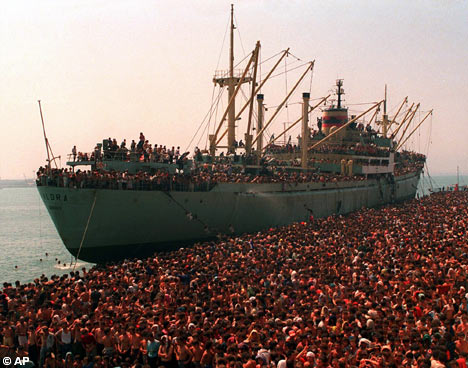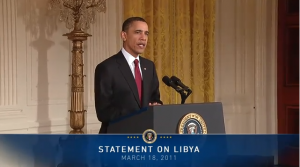
As Italy struggles to accept massive flows of refugees from the Arab Spring, one hopes that the G7 country has learned something in last 20 years. As Berlusconi’s channel report that the refugees are complaining about the quality of food and as leghista Roberto Maroni makes doom-laden statements about a biblical exodus, I urge contemporary Italians to look back to the events of early August 1991, when mass looting, rioting, and total loss of civil society led Albanians to flee their country — which was, like Libya, a former Italian colony.
By way of trying to get Italians to look beyond their own bell-tower in these days in which the country’s biggest trade partner has become the focus of international news, I quote award-winning Italian journalist Enzo Biagi from the Corriere della Sera of 12 August 1991 (quoted in Paul Ginsborg’s indispensable Italy and its Discontents). Substitute “Libyans” for “Albanians” to try and get a picture of today.
The dream of the Albanians has dissolved, but so too has that of the Italians. The fifth industrial power in the world has not been capable, in three days, of distributing ten thousand cups of coffee… Those plastic sacks of water thrown from above to the dehydrated immigrants, those sandwiches scattered by the solders into the scrambling mob — it was like being at the zoo.
As Fyodor Dostoyevsky said, “the degree of civilization in a society can be judged by entering the prisons.” Consider the refugee from a war-torn place as a prisoner of circumstance, and let us hope that the degree of civilization that Italy offers its non-citizens is as high as what it promises its own.
As Sylvia Poggioli reports from Lampedusa:
The people here are angry and they suspect the government wants to exploit the crisis for electoral aims. U.N. officials have criticized the government for being extremely slow in moving the migrants away from this tiny island to bigger and better equipped facilities on the mainland.
Now, keep in mind that the coalition, the ruling coalition, includes the powerful Northern League, which is virulently anti-immigrant. The interior minister, Roberto Maroni, is a member of the Northern League and he’s been warning for weeks of what he calls a biblical exodus from North Africa.
Now, the foreign minister [Frattini] went to Tunis yesterday to try to negotiate with the new authorities there, ways to monitor more carefully the Tunisian coast to prevent the exodus. And Italy went so far as to propose a payment of up to $2,500 to each Tunisian who voluntarily returns home. But the Northern League leader [Umberto Bossi] blasted the idea, saying why should we pay them? We should just pick them up and send them back.
Read and listen to the whole interview here.
Bossi and his similar-indignant followers — “paying immigrants?! But the state doesn’t pay us hardworking Italians! They’re treating immigrants better than their own people!” reeks of a selfish insularity that isn’t hard to imagine in the land where one needs not look beyond one’s own family home, or town steeple at best — one that should be brought into sharp relief by the disturbing images of Iman al-Obeidi‘s silencing and forced evacuation from the Rixos Hotel yesterday.
There are more compelling anti-war arguments out there that take diminishing state resources into account; here is Bob Herbert’s American perspective.
That the two countries have different interests regionally goes without saying. But what Italy and her elites — different to France and Britain, for example — seem to have a hard time realizing is that the degree of involvement that the country has in the region and in Libya specifically means that the country cannot continue to idly sit by. The lamentable reaction to the many (non-Libyans) coming ashore in Lampedusa reflects this idleness.
Some have said that Eni is essentially the foreign policy arm of the Italian government. Be that as it may, it would be heartening to see the government doing more than simply throwing its hands up into the air, occupied — as usual — with the naval-gazing exploits of a philandering prime minister.




